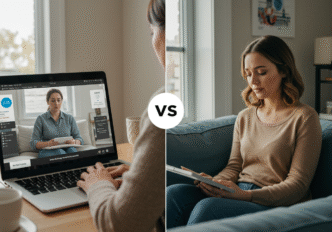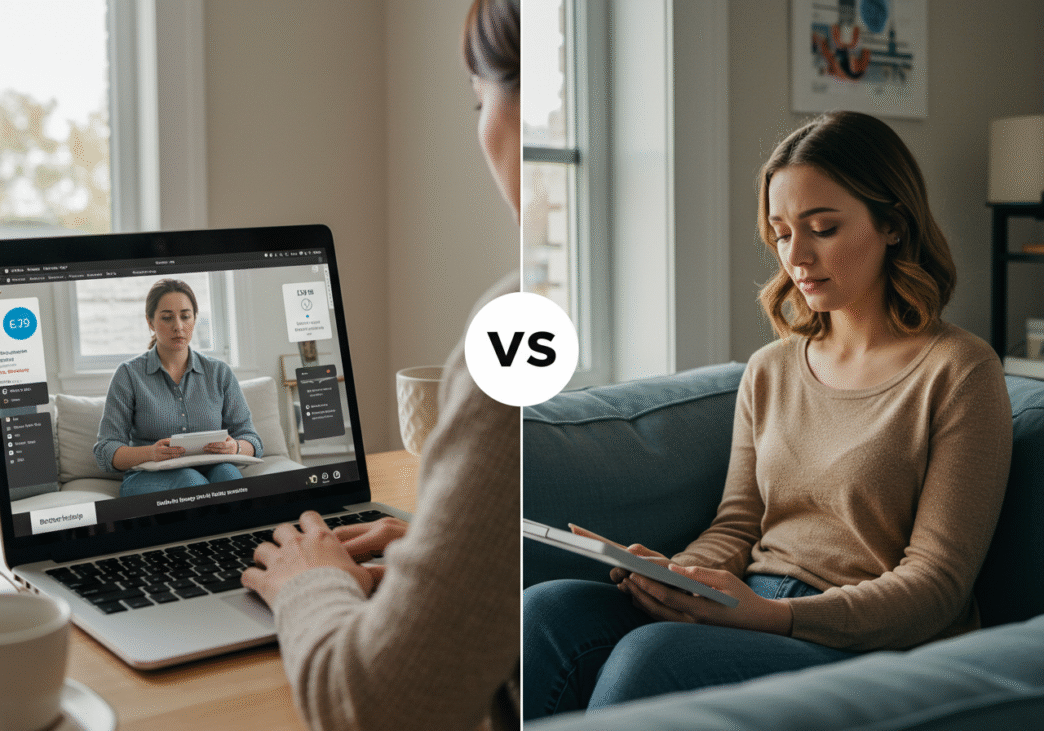

Let’s face it—life can be overwhelming sometimes. Between work stress, relationship issues, and just trying to keep it all together, our mental health often takes a backseat. I’ve been there too, wondering if therapy might help but hesitant about finding the time to actually go to appointments.
That’s where online therapy has really changed the game. No more scheduling nightmares or awkward waiting rooms—just accessible mental health support when you need it. But with so many platforms out there, how do you choose?
I spent weeks diving deep into the two biggest names in virtual therapy—BetterHelp and Talkspace—and I’m here to share what I found. This isn’t just a clinical comparison; it’s a real look at what each platform offers for real people dealing with real struggles.
The Rising Tide of Virtual Mental Health Support
The need for mental health services has exploded in recent years. Between pandemic stress, economic uncertainties, and the general chaos of modern life, more people are seeking therapy than ever before. But traditional in-person therapy comes with its challenges—it’s expensive, time-consuming, and sometimes just plain inconvenient.
Online therapy platforms have emerged as a practical solution, offering support that fits into your life rather than disrupting it. Whether you’re dealing with anxiety, depression, relationship issues, or just need someone to talk to, these services can connect you with licensed professionals from the comfort of your couch.
How Online Therapy Actually Works
Before we dive into the head-to-head comparison, let’s break down the basics. Online therapy is pretty straightforward (which is part of its appeal). You sign up, fill out a questionnaire about your mental health history and what you’re looking for, and get matched with a therapist.
The sign-up process usually takes about 10-30 minutes, with BetterHelp’s intake questionnaire being notably more thorough than Talkspace’s. Both platforms ask about your gender identity, mental health history, and provider preferences, but BetterHelp goes deeper with questions about family history and other factors.
Wait, this matters more than you might think! A friend of mine tried both platforms and found that BetterHelp’s longer questionnaire actually led to a better therapist match right off the bat. But I’m getting ahead of myself…
Once you’re matched with a therapist, you can communicate through text, video, or audio messaging, depending on your subscription plan. Some plans include live sessions, while others focus on asynchronous messaging.
BetterHelp: The Heavyweight Contender
BetterHelp boasts over 30,000 licensed therapists in their network—that’s a lot of mental health professionals! Their single subscription model starts around $70-$100 per week (billed monthly), depending on your location and therapist availability.
The Pricing Puzzle
Unlike Talkspace’s tiered approach, BetterHelp offers one all-inclusive individual therapy plan that includes:
- Weekly 45-minute live sessions
- Unlimited messaging between sessions
- Access to over 20 weekly group therapy sessions
I’ll be honest—I think the longer session length at BetterHelp is a huge advantage. Those extra 15 minutes (compared to Talkspace’s 30-minute sessions) make a significant difference when you’re diving into complex issues. As anyone who’s been in therapy knows, it often takes time just to get warmed up!
Matching Process & Therapy Experience
Here’s where things get interesting. BetterHelp uses an algorithm to match you with a therapist based on your questionnaire responses. You can’t choose your therapist initially, which feels a bit impersonal, but many users find their matches surprisingly accurate.
One thing I appreciate is how Little Wonder’s approach to therapy mirrors BetterHelp’s philosophy of making mental healthcare accessible to everyone. Both emphasize removing barriers to treatment.
The therapy sessions themselves are conducted via video, phone, or live chat—your choice. Many users report feeling a strong connection with their BetterHelp therapists despite the virtual format. The flexibility to switch between communication methods is definitely a plus.
BetterHelp Pros:
- Longer 45-minute sessions
- More affordable single pricing model
- Extensive group therapy options
- Financial aid available for those who qualify
- Available in 200+ countries
BetterHelp Cons:
- Doesn’t accept insurance
- No psychiatry services (medication management)
- Can’t initially choose your therapist
- Price varies by location and demand
- No services for children under 13
Talkspace: The Flexible Alternative
Talkspace takes a different approach with its tiered subscription model and more diverse service offerings. While they have fewer therapists (around 5,000+), they provide more specialized services, including psychiatry.
Breaking Down the Plans
Talkspace offers three main therapy plans:
- Messaging Therapy: $69/week for unlimited text, video, and audio messaging with guaranteed therapist responses 5 days a week
- Live Therapy: $99/week for four 30-minute live sessions per month
- Live + Messaging: $129/week combining both services
They also offer psychiatry as an add-on service at $299 for the initial evaluation and $175 for follow-ups. This is a major advantage if you need medication management alongside therapy.
A significant benefit of Talkspace is that they accept many major insurance providers, potentially reducing your out-of-pocket costs substantially. As someone who’s dealt with the headache of mental health insurance coverage, I can tell you this is a huge plus!
The Talkspace Experience
The mental health support community at American Psychological Association often discusses how different therapy modalities work for different people, and Talkspace embraces this with their variety of communication options.
When you sign up for Talkspace, you’re matched with three potential therapists and get to choose which one you’d prefer to work with. This agency in the selection process is something many users appreciate.
One unique feature is their symptom tracker, which helps you visualize your progress over time. They also offer workshops on various mental health topics for additional support.
Talkspace Pros:
- Accepts insurance (potentially lower costs)
- Offers psychiatry services and medication management
- Allows you to choose from three therapist matches
- Extensive messaging options between sessions
- Treats teens 13 and older
Talkspace Cons:
- Shorter 30-minute live sessions
- More expensive than BetterHelp for comparable services
- Some users report less responsive customer service
- Therapists can’t prescribe controlled substances
- App functionality issues reported by some users
Making Your Decision: Who Should Choose What?
After diving deep into both platforms, here’s my take on who should choose each service:
Choose BetterHelp if:
- You’re on a tighter budget and don’t have insurance that covers Talkspace
- You prefer longer therapy sessions (45 minutes vs. 30 minutes)
- You’d benefit from group therapy sessions
- You value flexibility in communication methods
- You’re comfortable with being algorithmically matched with a therapist
Choose Talkspace if:
- You have insurance that covers their services
- You need psychiatric services and medication management
- You prefer selecting your therapist from multiple options
- You prioritize messaging over live sessions
- You need therapy for a teenager or couples therapy
Common Questions About Online Therapy
How do I know if online therapy is right for me?
Online therapy can be great for many people, but it’s not for everyone. If you’re dealing with severe mental health issues that require intensive treatment or frequent in-person monitoring, traditional therapy might be better. But for many common issues like anxiety, depression, stress, and relationship problems, online therapy can be just as effective as in-person treatment.
I was skeptical at first too! But as someone who’s tried both traditional and online options, I can say that the convenience factor of virtual therapy made me more consistent with my sessions, which ultimately led to better results.
Is my information really private on these platforms?
Both platforms take privacy seriously, using encryption and following HIPAA guidelines to protect your information. That said, always make sure you’re in a private space during sessions, and be mindful of what you share.
What if I don’t like my therapist?
This happens! Chemistry matters in therapy. Both platforms make it relatively easy to switch therapists if you don’t feel a connection. Don’t hesitate to make a change—finding the right therapeutic relationship is crucial for effective treatment.
Can online therapists prescribe medication?
With Talkspace, yes—their psychiatry service can provide medication management, though they can’t prescribe controlled substances like Adderall or Xanax. BetterHelp doesn’t offer psychiatry services, so you’d need to look elsewhere for medication.
What about crisis situations?
It’s important to understand that neither platform is designed for crisis intervention. If you’re experiencing a mental health emergency, call 988 (the Suicide & Crisis Lifeline) or go to your nearest emergency room.
The Bottom Line
Both BetterHelp and Talkspace offer valuable services that make mental health care more accessible than ever before. Your choice ultimately depends on your specific needs, preferences, and financial situation.
Remember that the most important factor in therapy’s success isn’t the platform—it’s finding a therapist you connect with and being committed to the process. Sometimes that means trying a few different approaches before finding what works for you.
Mental health is a journey, not a destination. Whichever platform you choose, taking that first step toward getting support is something to be proud of.
Get 20% off your first month of BetterHelp by using our link and start your mental health journey today!












